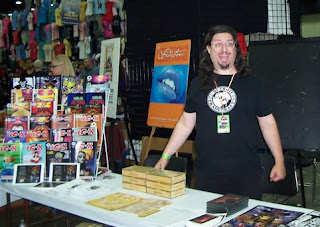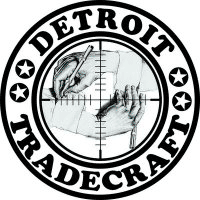
Detroit Tradecraft: We are talking with Michael Marcus during Detroit Fanfare 2011. We talked with him about a month prior--same difference--but still a cool talk.
DT: Michael, what long-term projects are you working on?
MM: I am currently working on IF-X, which comes out every two months. Its planned last issue is due to be released December 2012. In 2013 I will be running a genre based monthly series for a 12 month run. I am currently looking for stories to fill these spots now- my plan is to store up a years worth of content during 2012 so that I don't have to chase down creators for contributions by deadline and can print on time.
DT: What are your upcoming IF-X themes?
MM: The themes are:
Halloween, in stores by October 2011, (premiering at Fanfare)
West, in stores by December 2011, deadline November 2011
Dangerous Dames, in stores by February 2012, deadline January 2012
April Fools, in stores by April 2012, deadline March 2012
Luck, in stores by June 2012, deadline May 2012
Crime, in stores by August 2012, deadline July 2012
Halloween, in stores by October 2012, deadline September 2012
Endings, in stores by December 2012, deadline November 2012
DT: Wow! It sounds like you are planning way in advance. Why did you decide to go to genre-based books instead of the IF-X theme base?
MM: The problem with IF-X was that you never knew what types of content to expect with each issue. If it is genre-based, people will know what they are getting with each title--"Infinite Futures" will always be science-fiction, "Infinite Fear" will be horror, and so on. Once I have twelve months of content for a given title, I will produce it over twelve months, put out a trade paperback, and then move on to the next project.
DT: Is there a chance this could backfire? Maybe you may do an unpopular issue one month vs a popular one the next?
MM: That should not happen if people knew what they are getting in a given title. The hope is if people know what they are getting their favorite genre, they will stick with it. The only real variable is how long it might take to put together a 12-month content pile for any given genre.
DT: What are your biggest issue and value with comics?
MM: The biggest challenge for any creator is that it takes more effort to produce a work then it takes to consume and read... The biggest value of producing anything is having others see your vision and acknowledge your accomplishments.
DT: In your words, what do you do when putting out your book?
MM: As an editor, I provide a venue for the artist and maintain the quality of the book, including layout. As a publisher, I have to sell ads (sometimes design them), and in producing the book, I risk my name, credibility, and, of course, investment at the hands of the public.
DT: What would you like to do after one of your genre series ends?
MM: I would like to continue letting creators and artists play in the "comic sandbox." I would also like to keep on creating games, which is my primary joy.
DT: Games? Okay, what do you currently do with games?
MM: I can manufacture my own games, but I am also actively selling production licenses for various games I have created, including "Sudoku: Tactics."
DT: Are there conventions that are good for games licensing? I am aware of the Advanstar Licensing Show in New York for licensing properties.
MM: There are toy and games producers' conventions, like GAMA, and gaming conventions like Gen-Con, and Origins--there are usually companies there that will examine products and purchase licenses.
DT: Back to your 2013 year with the genre comics--do you have any clues to what we can expect?
MM: Well, one of the titles I have in mind is called "WRONG." I want that book full of controversial material, whether politically incorrect, bizarre, or just shocking. I want say something, but not with a gimmick or cliche'; something that makes people think...
DT: What do you value most of the accomplishments you have made?
MM: One of the wisest people I've worked for said that the real value of one's life is in the way he or she touches other lives for the better. I feel that IF-X has formed such a community with creators. It gave proof of concept for artists and writers, even to the point of "discovering" some new talent, even though the book wasn't really all that profitable an experiment. Still, I can build off of that and make the next project better for all involved.
